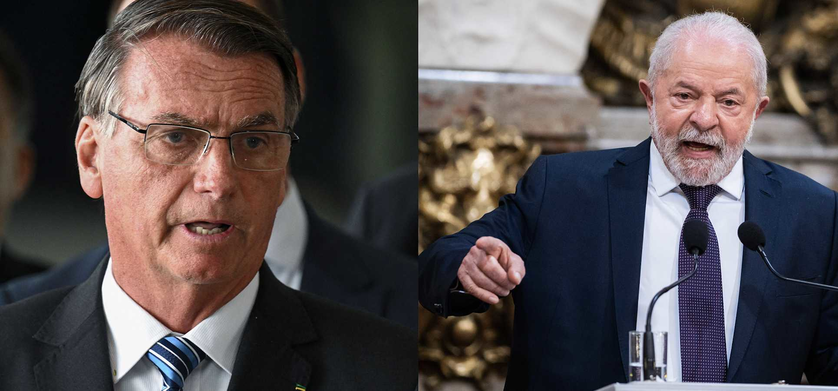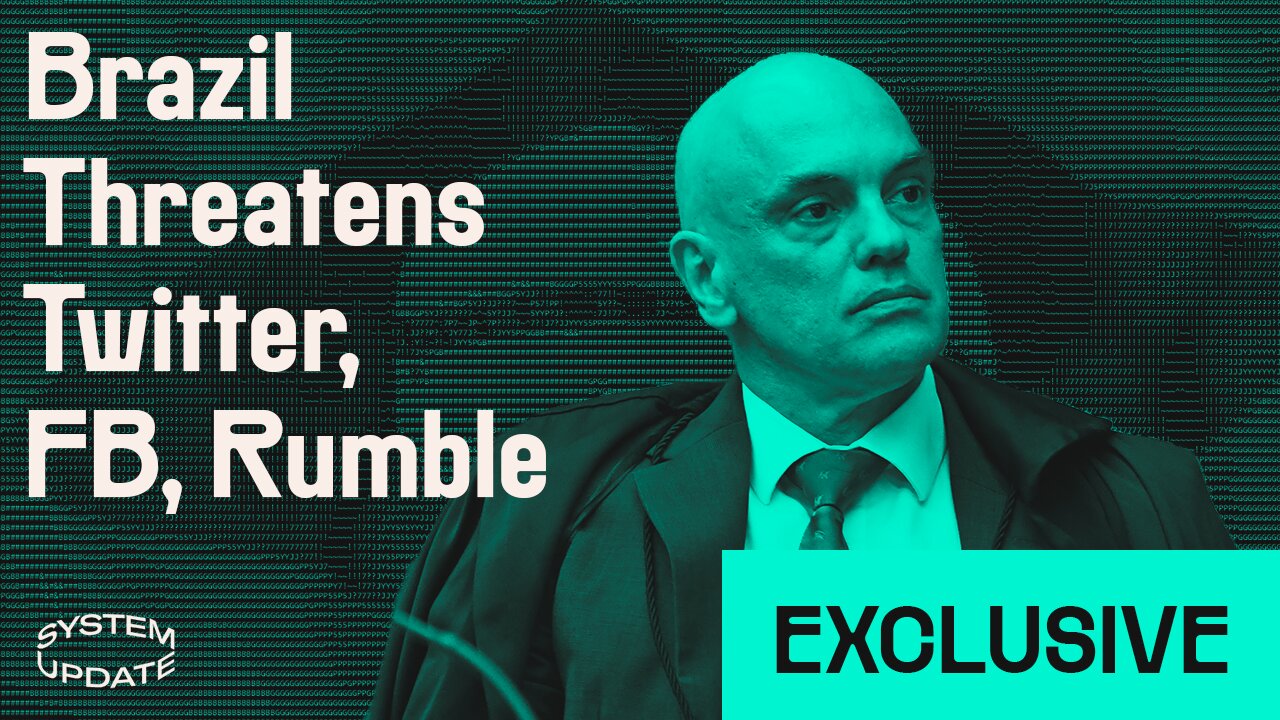
A major escalation in official online censorship regimes is progressing rapidly in Brazil, with implications for everyone in the democratic world. Under Brazil's new government headed by President Lula da Silva, the country is poised to become the first in the democratic world to implement a law censoring and banning "fake news and disinformation" online, and then punishing those deemed guilty of authoring and spreading it. Such laws already exist throughout the non-democratic world, adopted years ago by the planet's most tyrannical regimes in Saudi Arabia, Egypt, Qatar, the United Arab Emirates and Turkey.
If one wishes to be generous with the phrase "the democratic world" and include Malaysia and Singapore – at best hybrid "democracies" – then one could argue that a couple other "democratic" governments have already seized the power to decree Absolute Truth and then ban any deviation from it. But absent unexpected opposition, Brazil will soon become the first country unambiguously included in the democratic world to outlaw "fake news" and vest government officials with the power to banish it and punish its authors.
Last May, the U.S. Department of Homeland Security was forced to retreat from its attempt to appoint a "disinformation czar" to oversee what would effectively be its Ministry of Truth. That new DHS agency, at least nominally, was to be only advisory: it would declare truth and falsity and then pressure online platforms to comply by banning that which was deemed by the U.S. Security State to be false. The backlash was so great -- the CIA and company are not exactly world-renown for telling the truth -- that DHS finally claimed to cancel it, though secret documents emerged in October describing the agency's plans to continue to shape online censorship decisions of Big Tech.
Brazil's law would be anything but advisory. Though the details are still yet to be released, it would empower law enforcement officials to take action against citizens deemed to be publishing statements that the government classifies as "false," and to solicit courts to impose punishment on those who do so.
The Brazilian left is almost entirely united with the country's largest corporate media outlets in supporting this censorship regime (sound familiar?). The leading advocates of this new censorship law include pro-government lawyers, famous pro-Lula YouTube influencers, and even journalists(!). They are now being invited to and feted in "fake news" and "disinformation" conferences in glamorous European capitals sponsored by UN agencies, because the EU is eager to obtain such censorship powers for itself, and sees Brazil as the first test case for whether the public will tolerate such an aggressive acquisition of dissent-suppression authorities by the state. (Recall that the EU itself, at the start of the war in Ukraine, escalated online censorship to an all-new level by making it illegal for any online platform to host Russian-state media outlets; Rumble's refusal to obey France's command to remove RT from its platform forced Rumble to cease broadcasting in France).
Last Sunday, Brazil's largest newspaper, Folha of São Paulo, announced that I had become a regular columnist for the paper (I will likely publish columns every other week, and those with international relevance will be published in English as well). Their offer came after months of rather intense controversy in which I have been vocally denouncing as dangerously authoritarian the regime of censorship and other weapons of dissent-suppression imposed by a member of Brazil's Supreme Court, Alexandre de Moraes.
Even prior to enactment of this newly proposed law, the online censorship attacks of this single Brazilian judge, acting with the support of the a majority of its Supreme Court, has been so extreme that even liberal American news outlets have published critical articles on him and what they suggests are his lawless and wild censorship binges (including three in The New York Times, one in the Associated Press and another in The Washington Post). One New York Times article – published weeks before the first round of the 2022 presidential race that sent Lula and incumbent President Jair Bolsonaro to a run-off – described the judge's conduct this way:
Mr. Moraes has jailed five people without a trial for posts on social media that he said attacked Brazil’s institutions. He has also ordered social networks to remove thousands of posts and videos with little room for appeal. And this year, 10 of the court’s 11 justices sentenced a congressman to nearly nine years in prison for making what they said were threats against them in a livestream.
The power grab by the nation’s highest court, legal experts say, has undermined a key democratic institution in Latin America’s biggest country as voters prepare to pick a president on Oct. 2.. . . In many cases, Mr. Moraes has acted unilaterally, emboldened by new powers the court granted itself in 2019 that allow it to, in effect, act as an investigator, prosecutor and judge all at once in some cases.
As the AP articles notes, we were the first to reveal one of Judge de Moraes' secret censorship orders, which I obtained and then reported on in an episode of SYSTEM UPDATE, which was viewed by more than half a million people:

Despite also being the journalist who – back in 2019 and 2020 – exposed the grave corruption committed by the once-heroic Brazilian judge and prosecutors who imprisoned Lula in 2017 – reporting that won top journalism awards in Brazil, garnered universal praise from the Brazilian left, resulted in an unsuccessful attempt to prosecute me, and ultimately led to Lula's release from prison and restored his eligibility to run for president in 2022 – both my husband David Miranda (a Congressman until last month) and I have, overnight, become among the most reviled figures by Lula's followers. This has been in part due to my increasingly active opposition to growing censorship efforts led by this judge and his left-wing allies, censorship which the Brazilian left and their corporate-media allies support with great fervor and with something close to lock-step unanimity.
Those left-wing attacks against us began when David announced in January, 2022 that he was leaving his left-wing party PSOL – which had long been opposed to PT and Lula – because he objected to the party's decision to support Lula's presidential candidacy in the first round of voting. He instead joined the center-left party PDT in order to support presidential candidate Ciro Gomes.
Because David was the first national left-wing political official to publicly refuse to support Lula's candidacy in the first-round of voting, it was necessary for PT to make an example of him (and, by extension, of me). The campaign of vilification was deeply personal. Even as a couple accustomed to being the target of such campaigns, the attacks on us from Lula's followers were unlike anything I had seen in terms of vitriol, unrestrained online mob rage, and the kind of bigoted tropes the left pretends it reviles but instantly unleashes against any member (such as David) of the "marginalized groups" the left believes it owns.
As is true in the U.S., nothing enrages the left and provokes the lowest and most scurrilous attacks more than when a person they believe they own due to their membership in a "marginalized" group who proclaims their independence and right to think critically (in September, I was forced by David's health crisis to petition the election court to withdraw his re-election candidacy, and the new Congress was inaugurated on February 1 without him).
But those already-lowly attacks escalated severely when I became much more vocal about my increasing concern over the country's growing reliance on censorship and due-process-free persecution of PT's opponents. Unlike in the U.S. – where the liberal-left still pays lip service to their support for free speech while clearly acting to subvert it – the Brazilian left barely bothers with this pretense. Many simply acknowledge that they do not believe in free speech, and equate a defense of free speech with fascism. They do so with no apparent recognition of the irony – that the first thing a fascist regime does is ban books and criminalize dissent – and despite the fact that free speech is a right guaranteed by the Brazilian constitution.
For the globalist order increasingly petrified of internet freedom - they blame online free speech for everything from Brexit and Hillary's defeat to skepticism of health authorities and growing opposition to U.S. support for the proxy war in Ukraine – Brazil has become the perfect test case for seizing state power to censor the internet in the name of stopping "fake news and disinformation." Nothing fosters support for authoritarianism the way fear does, and much of the Brazilian establishment believes they are fighting a new War on Terror. Even with Bolsonaro vanquished for now in Florida, his party in the last election won the most seats in both houses of Congress as well as key governorships across the country.
Just as the Bush/Cheney government exploited the 9/11 attack, and the Biden administration still exploits the January 6 riot, to justify previously unthinkable assaults on core civil liberties, the Brazilian left – in union with the country's establishment – is now exploiting the January 8 invasion of government buildings by a few thousand Bolsonaro supporters to argue that anything and everything is justified in the name of their "war on terrorism" (unlike the 3,000 deaths on 9/11, and the deaths of four Trump supporters on 1/6, nobody died or was grievously injured on January 8 in Brasilia). And using the same playbook of neocons to support their crisis-justified civil liberties attacks, anyone in Brazil who even questions the need for new censorship powers and other attacks on dissidents demanded by the government is accused of being "pro-Terrorist" or an "apologist for fascism" (I honestly never thought I would live to see the day when one stands accused of being pro-facist for opposing censorship rather than supporting it, but such are the times in which we live).
That is why Europe, and large sectors of the U.S. establishment, see Brazil as the perfect laboratory to test how far censorship powers can go. With many Brazilians believing they just suffered their own 9/11 or January 6, all power centers know that the perfect time to seize new authoritarian powers and abridge core liberties is when the population is in a state of fear and terror, and thus willing to sacrifice liberties in exchange for illusory promises of security.
And recall that polling data in the U.S. shows that very large majorities of Democrats (and a disturbingly robust minority of GOP voters) would support a law similar to the one pending in Brazil to empower the state to restrict internet freedom in the name of stopping "misinformation." As Pew found in 2021, 65% of Democrats "say the government should take steps to restrict false information, even if it means limiting freedom of information." Perhaps the First Amendment would be a barrier to implementation of such a law in the U.S., but there is ample public support, especially on the liberal-left, for state censorship of the internet.
A major reason I accepted the offer to become a Folha columnist is that it gives me a significant platform in Brazil to combat what I regard as these increasingly grave attacks on core liberties, not only because they threaten rights of free speech, due process and a free internet in Brazil, but because they threaten all those values far beyond Brazil's borders as well. My reporting on this new "fake news and disinformation" law sought by Lula's government as set forth below includes parts of my first Folha column published last Sunday on the dangers of this newly proposed law, as well as significant new passages I wrote for an international audience and for publication of this new article here on Locals.
Ten days before the run-off voting for the 2018 presidential election which sent Bolsonaro into the presidency, Folha reported that an "illegal practice" was being used to help Jair Bolsonaro win that election. "Companies are purchasing large packages of messaging assailing [Lula's] Workers' Party (PT) for mass dissemination on WhatsApp," Folha explained.
Bolsonaro not only denied the story but accused both Folha and PT of spreading Fake News. As Folha noted at the time, Bolsonaro's party "intended to sue" his election-year rival Fernando Haddad of PT. Bolsonaro accused PT of "spreading false news."
Upon winning the presidency, there was no law available to Bolsonaro – similar to the one which Lula's government is now proposing – that would have empowered his government, or judges sympathetic to him, to ban discussion online of Folha's reporting by claiming it was "fake news." But if he did have that power – if the law which PT hopes to implement to govern "fake news" had been in the hands of Bolsonaro's allies – it is very reasonable to suspect they may have used it to suppress those revelations on the ground that, in the view of Bosonaro's supporters, the allegations were "false."
After all, the new law proposed by Lula's government would empower both the judiciary and the equivalent of Brazil's Solicitor General (AGU) to take more aggressive action to combat "fake news" online. Among other new powers, the proposed law would permit "an action by the AGU, a body that legally represents the government, to file legal cases against those it regards as authors of false content."
In a January 19 interview with Folha, Lula's chief spokesman, Paulo Pimenta, vowed: "we will start to respond more forcefully, more sharply, to information that distorts the truth and is wrong."
Everyone would love to live in a world in which an omnipotent and benevolent power who rules us allows only truthful statements, while it accurately identifies and then outlaws all false claims. Such a world sounds like paradise: no errors, only truth. Who could possibly be opposed to that?
Unfortunately, human nature makes such a world impossible. If history teaches any lesson, it is clear that treating human leaders or institutions as capable of god-like infallibility and super-human wisdom is quite dangerous.
Humans have tried all this before. For a thousand years prior to the Enlightenment, most societies were ruled by omnipotent institutions – monarchies, empires, churches – that claimed to possess absolute truth and therefore outlawed any views that deviated on the ground that they were "false."
The core innovation of the Enlightenment, one of the greatest intellectual advancements of human liberation, was that all human institutions are fallible, that they endorse false claims either due to error or corruption, and that every individual must always retain the right to question and challenge their orthodoxies.
In sum, there is no such thing as an institution of authority that can be trusted to decree what Truth is. The oldest indigenous societies, far from Europe, had already internalized this lesson, having discarded faith in centralized authorities in favor of decentralized power and dispersed democratic values. And what is now called "the democratic world" is founded in the view that secular truths are ascertained not by decrees of monarchs, clerics and emperors, but by free and open debate driven by human reason and the sacred right to dissent.
Since the start of the COVID pandemic, it has been bizarre to hear left-liberals throughout the democratic world proclaim their devotion to science while simultaneously demanding that all "false statements" about science be banned. Science cannot exist if one assumes that permanent truth has already been apprehended. Science requires the acknowledgement that even its most brilliant and accomplished experts may have embraced grave errors and faulty assumptions. Scientific truth is unearthed only by permitting challenges to prevailing orthodoxies, not by prohibiting let alone outlawing them.
To say that one believes in science while demanding that "falsity" be banned is like saying that one believes in religion while demanding that prayer be banned. Scientific discovery, like all intellectual endeavors, only advances by a process of trial and error, by challenging and objecting to prevailing beliefs so that error can be uncovered. To ban "false claims" is not to honor and strengthen science but to vandalize and kill it.
From the start of the COVID pandemic, many of the claims made by the world's most prestigious experts and trusted institutions have turned out to be false or uncertain. As just one example, the World Health Organization announced in February and March of 2020 that asymptomatic people should not wear masks and that doing so could make a COVID infection worse by "trapping" the virus. In April, the recommendation was the opposite: everyone should wear masks regardless of one's health condition.
In 2018, any Brazilian "fact-checker" would have affirmed as true the statement that Lula was a "thief," as he was convicted of multiple corruption felonies, which Brazilian appellate courts affirmed on appeal. By 2022, the situation was reversed as Brazilian courts nullified that conviction (in large part based on the revelations of our reporting regarding the corruption on the part of Lula's judge and prosecutors). As a result, Brazil's election courts in the 2022 campaign banned campaign materials calling Lula a "thief" on the ground that they were false.
In other words, what was considered Gospel about Lula in 2018 became prohibited Falsity just four years later. That is the unyielding, universal pattern driving human intellectual advancement: what is deemed Truth one minute becomes shameful and discredited the next.
For that reason, at the heart of every censor resides one of the most toxic human traits: hubris. It is astonishing to watch some humans believe that they have managed to liberate themselves from this historical cycle of misperception, misapprehension and error, and instead believe that they have become owners of the Truth. Even with the best of motives, only hubris would lead people to have so much confidence in their truth-finding abilities that they would want the state to make it a crime to question or deny their views of the world. And yet no other mentality than this one can account for someone supporting the kind of law to ban and punish "fake news and disinformation" as the new Brazilian government and its allies in Congress are on the verge of adopting.
Error is the inevitable condition of even the most well-intentioned humans. But most humans do not operate with the purest of motives. Humans with great power are highly likely to abuse that power absent very serious limits. Even if you believe you finally found political leaders with almost god-like virtue, who can be trusted not to abuse such powers when suppressing ideas as "false," it is extremely likely such laws will be transferred in the future to new leaders with different ideologies and who are more human than the deity you have been fortunate enough to have found.
And as has been widely reported, the new industry to define "disinformation" is largely a scam. It is funded by a small handful of liberal billionaires, and employs highly politicized actors who claim a fake expertise – "disinformation experts" – to masquerade their ideological views as science. Any attempts by the state to make "fake news and disinformation" illegal will almost certainly rely on this fraudulent industry to justify their censorship decisions by claiming that their assessment of truth and falsity has been supported by "experts."
If Brazil implements this proposed law, it will not be the first time a government is empowered to ban "fake news" on the internet. Other countries live under governments which have been given the power to ban journalism and commentary on the ground that it is judged by the state to be dangerous, to be false, to incite violence, or to foster social instability or even revolutions against the prevailing order.
Regimes with such laws are the planet's most despotic: Saudi Arabia, United Arab Emirates, Egypt, Singapore and Qatar (whose law, entitled "Crimes against the internal security of the State," allows the state to "impose up to five years imprisonment on anyone who spreads rumors or false news with bad intent").
There, the outcome is predictable. All dissent against government orthodoxies and criticism of its leaders are quickly labeled "false" or "dangerous" or designed to incite violence and are censored on that ground. Last May, the UN, warning about a newly proposed "anti-disinformation" law in Turkey, "expressed concern after the vote by the Turkish parliament of a law that could imply the imprisonment of up to three years of journalists and users of 'social media' for the dissemination of 'fake news'."
Those attacks on dissent using these "Fake News" laws are not due to "abuse of a good law." They are, instead, the inevitable, arguably the intended, outcome of such a law. No political faction is immune from believing that any dissent from its core pieties is not just misguided but deliberately false and even dangerous.
The dissent-suppressing persecution where such laws have been allowed to flourish are entirely predictable. Only in authoritarian cultures, or ones that wish to return to the pre-Enlightenment days of full submission to institutions of authority, would citizens trust political, governmental or religious officials with the power to declare absolute truth and then, using the force of law, bar any expression that deviates from it.
These abuses of "fake news" laws happen in those countries where those laws have been adopted not because those countries are different than ours, but because they are the same. All powerful leaders, even well-intentioned ones, will be highly tempted to ban dissent on the grounds that it is dangerous or "false."
Humans, by our very nature, are incapable of acquiring absolute truth about politics or science even with the best of motives. What one generation believes to be proven Truth (the earth is the center of the universe) is demonstrated by subsequent generations to be gross error, though such truth-tellers often suffer severe persecution when "falsity" is rendered illegal (which is why Socrates, Copernicus, Galileo, Voltaire and many others like them wasted years attempting to avoid prison or worse, often unsuccessfully, due to laws banning ideas deemed "false" by the reigning authorities of their era). The intellectual history of humanity has one indisputable lesson: humans will always err when claiming they have discovered such absolute truth that nobody should be permitted to doubt or challenge their claims.
It is likely for these reasons that "the large portion" of the Brazilian legal specialists consulted by Folha about Lula's proposed law to ban "fake news and disinformation" emphasized "that a legal process of this kind by the government can set a precedent that represents a risk to freedom of expression, given the possibility of being weaponized for judicial harassment against critics and opponents."
Even if you are lucky to have found the most trustworthy and benevolent leaders in history, ones who are somehow capable of decreeing truth without erring and who use such laws only in the most noble ways – something the Brazilian left believes of Lula and his government – at some point other leaders will be elected and they, too, will have such powers.
When assessing whether one should support a proposed law, the key question is not whether one is comfortable with it in the hands of leaders one likes and trusts, but whether one is comfortable with such powers in the hands of different leaders.
























